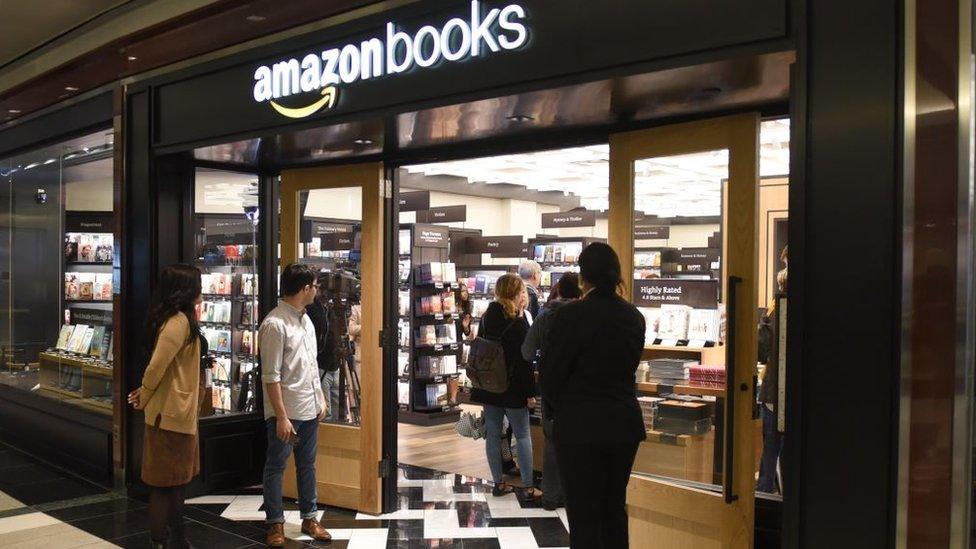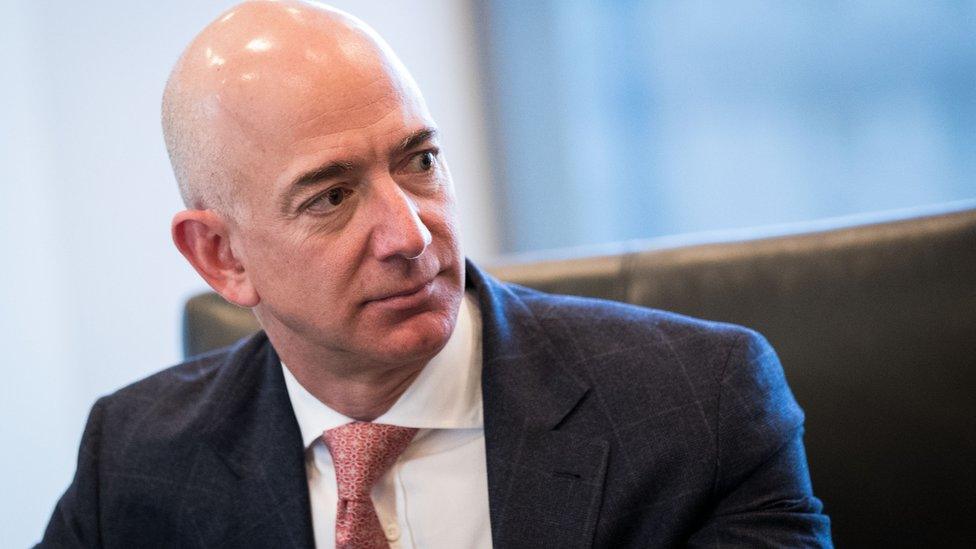Are Google, Amazon and others getting too big?
- Published

Are the tech giants getting too big to control?
The US tech giants Apple, Google's parent Alphabet, Microsoft, Amazon and Facebook are the five biggest companies in the world by market capitalisation. Their increasing dominance is fuelling concerns about competition and data privacy.
So are regulators about to get tough?
Shares in Amazon and Alphabet raced past the $1,000-mark this month, the latest sign of the companies' growing might.
Google is expected to attract more than 40% of digital advertising dollars this year; Amazon is on track to collect half of US online sales by 2021, according to at least one analyst.
But as investors cheer their rise, it's also causing concern amongst the powers that be.
US regulators have long lagged Europe when it comes to cracking down on anti-competitive behaviour but Jonathan Kanter, a Washington-based antitrust attorney at Paul Weiss, believes attitudes may be changing.

Online retailer Amazon has now moved into bricks and mortar shops, too
"People are asking questions about whether the tools and principles that have been used previously are the right ones to continue using.
"There are certainly lots of people who think that there needs to be some change."
The power of data
John Kwoka, a professor of economics at Northeastern University in Boston, believes that taking a tougher line on mergers and acquisitions won't necessarily be enough to combat the rising power of giants like Amazon.
These firms also gain power as they amass user data and shape the flow of information, controlling consumer access to the firms using their platforms, he argues.
Amazon: Monopoly or capitalist success story?
Safe Harbour: Tech firms shudder as watchdogs meet
How Facebook's tentacles reach further than you think
"They steer choice and do so in ways that have ripple effects throughout a broader economy," Prof Kwoka says.
Lina Khan, a fellow at the New America think tank, published a paper about Amazon earlier this year.
She says there are examples of tech firms skirting the rules on competition, pointing to Amazon's battle with diapers.com, the baby products retailer. Amazon lowered prices, undercutting the firm, then eventually acquired it.

Google is still being investigated by European regulators for alleged anti-competitive behaviour
There are signs that the politicians and regulators are waking up.
This spring, the US Congress moved to dismantle a set of Obama-era laws protecting the privacy of consumer data.
Then shortly afterwards, a group of Republicans introduced a broader proposal, external that would require firms such as Google and Amazon - in addition to traditional internet providers - to get user permission before sharing their data.
European lead
Could the US adopt the more muscular approach of European regulators?
In 2013, the European Commission fined Microsoft for giving preferential treatment to its own browser, Internet Explorer.
This year, it fined Facebook for providing "incorrect or misleading" information during its acquisition of messaging service WhatsApp.

Critics say the tech giants have a near-monopolistic power than needs to be curbed
Last month, Amazon promised, external the European Commission it would stop enforcing contracts deemed anti-competitive for other e-book publishers.
And an investigation, external into Google's parent company, Alphabet, over how it allegedly gives preferential treatment to its own shopping services in search results, is still proceeding.
The EU actions show that "there are things that could be done," Prof Kwoka says.
"Whether they would be a big deal or a little deal, it's hard to know, but the EU has taken a crack at it and we've mostly taken a pass."
Trump action?
It's not clear how President Trump wants to steer policy.
As a candidate he adopted populist rhetoric, describing Amazon as a monopoly and saying boss Jeff Bezos had a "huge antitrust problem, external".
He chose Makan Delrahim, a traditional Republican, to lead the Department of Justice antitrust division.

Say what? Amazon boss Jeff Bezos was unimpressed by President Trump's comments
On the Federal Trade Commission, the other key regulatory body, several vacancies remain. But the agency said it would host a 2018 conference on privacy questions raised by emerging technologies, its third on the subject.
Prof Kwoka and others say they don't expect to see major changes any time soon.
'Consumer choice'
And are these tech giants as anti-competitive as some think?
Amazon may dominate digital sales, but bricks-and-mortar shopping still dwarfs the online market. Walmart alone reported sales worth more than three times Amazon's last year.
Heavy hitters, including Microsoft and Google, are competing for customers in cloud services with the likes of IBM and Salesforce.
In the tech sector, consumers are free to head to new players from emerging markets.

Could Chinese online retail giant Alibaba take on Amazon?
The Chinese tech giants - Baidu, Alibaba and Tencent - are resisting the US hegemony pretty well, non-interventionists argue.
"It's a competitive market just because of consumer choice," says Ronald Josey, an internet and digital media analyst at JMP Securities.
"That's a really important point to the whole story."
Growth v risk
Even if US regulators do begin to flex their muscles, financial analysts say they aren't worried about a crackdown hurting companies, even in Europe.
Their growth potential outweighs any regulatory risks, argues Paul Gallant, a technology policy analyst at investment firm Cowen & Co..
"Investors are aware that companies with this kind of power and market share are inevitably on the minds of antitrust regulators. They're also aware that Trump has said some negative things," says Mr Gallant.
More Technology of Business
"It's in the back of investors' minds, but it's not close to overcoming what investors love about these companies," he says.
Google and Facebook have made efforts - effective or otherwise - to address issues such as fake news, in part to pre-empt regulator action.
How did Google become the world's most valuable company?
Why is the EU gunning for Google?
But James McQuivey, an analyst at the research firm Forrester, says the recent dramatic increases in share prices could be a sign investors are underestimating the likelihood of regulator action.
"If you'd said to me a year ago, 'Is the risk factored in to the stock price?' I would have said yes. Where it is now, at least some of the more recent buyers may not be paying attention to those risks," he says.
Amazon and Google declined to comment for this feature.
Follow Technology of Business editor Matthew Wall on Twitter, external and Facebook, external
Click here for more Technology of Business features, external